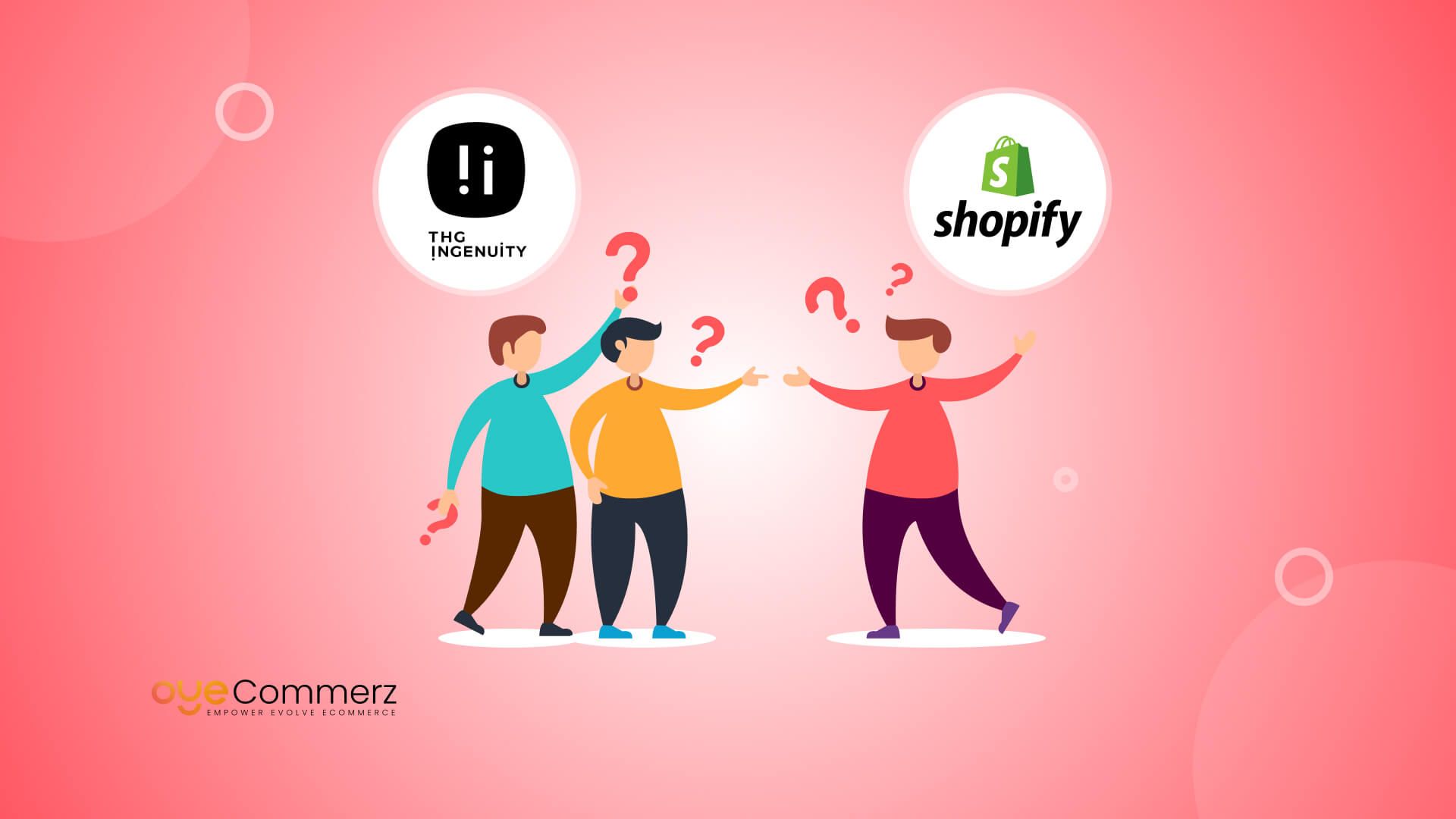Many businesses struggle to find the right eCommerce solution that balances flexibility, ease of use, scalability, and cost-effectiveness. While THG Ingenuity is a powerful platform tailored to large-scale, complex retail operations, Shopify Plus is known for its simplicity, user-friendliness, and rapid setup. The question remains: Which platform will help your business grow without adding unnecessary complexity or cost? In this article, we’ll compare both platforms, helping you make an informed decision based on your specific business needs.
Table of Contents
ToggleTHG Ingenuity vs Shopify Plus: An Overview of the Platforms
When evaluating eCommerce platforms for enterprise-level businesses, understanding the fundamental differences between THG Ingenuity and Shopify Plus is crucial. Both platforms offer robust solutions for scaling businesses, but their approaches and features cater to distinct business needs. Let’s delve into their core offerings and how they align with different operational models.
THG Ingenuity
THG Ingenuity, developed by The Hut Group, is an end-to-end eCommerce platform initially designed to support the group’s own brands. Over time, it has evolved to provide third-party businesses with a fully managed service, focusing on global expansion. THG Ingenuity is particularly effective for brands in sectors such as beauty, wellness, and luxury, where logistics, international reach, and omnichannel capabilities are essential.
Key Features:
- End-to-End Services: Offers a comprehensive suite that includes hosting, logistics, warehousing, and customer service, making it a true all-in-one solution.
- Global Reach: Supports over 195 countries, providing 32 languages and 40 payment options, ensuring brands can scale internationally.
- Bespoke Solutions: Provides highly tailored solutions, allowing businesses to customize their setup within the platform’s framework.
While THG Ingenuity excels in delivering a fully integrated, managed service, it is often considered an “all-or-nothing” solution. The platform’s proprietary systems can limit flexibility, particularly for brands that seek more control over their technology stack or wish to manage specific operations in-house. As a result, businesses may find it challenging to implement additional customizations outside of THG Ingenuity’s built-in features, which may hinder innovation for some users.
Shopify Plus
In contrast, Shopify Plus offers a more modular approach, providing the flexibility to build and customize stores using a wide range of third-party apps and integrations. It is a cloud-based platform designed specifically for high-growth, high-volume businesses, making it a highly scalable option for brands looking to innovate while expanding their online presence.With a user base of over 1.75 million merchants globally and a 10% year-over-year growth rate, Shopify has cemented its position as a go-to platform for brands of all sizes
Key Features:
- Scalability: Shopify Plus is capable of handling up to 10,000 transactions per minute, supporting businesses with high traffic and demand.
- Customization: With access to over 7,000 apps on the Shopify App Store, businesses can easily enhance functionality and integrate tools that meet their unique needs.
- Ease of Use: Shopify Plus stands out for its user-friendly interface, allowing teams to manage stores without requiring extensive technical expertise.
- Flexibility: The open API architecture facilitates custom app development, providing brands the ability to create bespoke solutions that align with their business objectives.
Unlike THG Ingenuity, Shopify Plus is highly regarded for its agility and adaptability. Its ability to rapidly integrate new tools and modify workflows makes it ideal for businesses that need to innovate continuously while scaling. This flexibility, combined with Shopify’s robust app ecosystem, offers businesses the opportunity to stay ahead of market demands and customer expectations.
Pros and Cons of THG Ingenuity
While THG Ingenuity offers a range of powerful features, it’s not without limitations. Here’s a closer look at the pros and cons.
Pros
- End-to-End Solution: THG Ingenuity handles everything from logistics to marketing, allowing brands to focus on product development and growth.
- Global Infrastructure: The platform’s built-in infrastructure makes it easier to scale globally without managing separate logistics or third-party fulfillment centers.
- Bespoke Customization: THG Ingenuity is tailored to the brand’s needs, offering more hands-on customization for businesses looking for a turnkey solution.
- Omnichannel Support: Provides seamless omnichannel retailing, helping brands bridge the gap between online and offline commerce.
Cons
- Vendor Lock-in: With its all-in-one system, brands relying on THG Ingenuity may face vendor lock-in, making it challenging to migrate or incorporate third-party tools easily.
- Lack of Flexibility: Businesses that want control over certain aspects of their tech stack may find the platform too restrictive, particularly if they want to integrate their own apps or backend systems.
- Limited App Ecosystem: Unlike Shopify’s expansive app store, THG Ingenuity’s ecosystem is much more limited, potentially stifling innovation.
- High Costs: The full-service nature of THG Ingenuity may come at a premium, particularly for brands that don’t need all of the services included.
Pros and Cons of Shopify Plus
Shopify Plus, designed to support enterprise-level businesses, is known for its modular approach and app ecosystem. However, like THG Ingenuity, it comes with its own set of trade-offs.
Pros
- App Ecosystem: The Shopify App Store offers over 7,000 apps, allowing businesses to add functionality and customize their stores without requiring extensive development work. For example, must-have Shopify apps like Klaviyo (for email marketing) and Rewind (for data backups) are readily available.
- Customization & Flexibility: Shopify Plus offers extensive customization through its Liquid template language and open APIs, empowering brands to build exactly what they need while maintaining control over their backend.
- Ease of Use: Shopify’s intuitive interface is designed for non-technical users, allowing teams to quickly manage their store’s day-to-day operations.
- Community & Support: Shopify provides 24/7 priority support for Plus users, along with access to a community of experts, developers, and agencies to assist in store optimization and growth.
Cons
- Transaction Fees: While Shopify Plus eliminates the standard Shopify transaction fee if you use Shopify Payments, there are additional transaction fees when using third-party payment gateways.
- Third-Party Reliance: While the app ecosystem is one of Shopify’s strengths, it also means that brands may rely on multiple third-party tools, which could introduce complexities in managing those integrations.
- Customizations Require Expertise: Despite being user-friendly, certain advanced customizations (e.g., custom checkout experiences) still require the expertise of a Shopify Plus design or development agency, such as Oyecommerz.
Scalability and Performance: THG Ingenuity vs Shopify Plus
When comparing scalability and performance between THG Ingenuity and Shopify Plus, it’s important to understand how each platform handles enterprise-level demands. Both platforms are designed to support large-scale businesses, but they approach scalability in fundamentally different ways, offering distinct advantages and trade-offs.
THG Ingenuity
THG Ingenuity offers scalability through its fully managed service, which is tailored for handling complex, global operations. The platform is equipped to manage logistics, warehousing, shipping, and customer support across multiple regions, making it an excellent choice for businesses with international reach. This approach ensures that businesses can scale their operations without having to worry about the technical infrastructure required for expansion.
However, this model comes with some inherent limitations. Since THG Ingenuity is a proprietary platform, businesses are reliant on its internal systems for updates and changes. This can reduce agility and slow down time-to-market when it comes to implementing new features or adapting to technological advancements. For companies looking for more flexibility and faster iteration, these constraints can pose challenges as they scale.
Shopify Plus
In contrast, Shopify Plus is engineered specifically for speed and scalability, making it an ideal choice for businesses that need to rapidly scale while maintaining performance. Shopify Plus can handle up to 10,000 transactions per minute, which is critical for large-scale promotions or flash sales. This performance capacity ensures that your store remains operational and performs optimally during periods of high traffic, reducing the risk of downtime.
Additionally, Shopify Plus leverages a Content Delivery Network (CDN) to ensure that loading times are fast, even during peak traffic periods. This feature is particularly valuable for businesses that operate in global markets, as the CDN reduces latency by serving content from servers closest to the user’s location.
Integration and Customization: THG Ingenuity vs Shopify Plus
A key consideration for enterprise-level businesses is the ability to seamlessly integrate with existing tools, customize the platform, and create unique customer experiences. Both THG Ingenuity and Shopify Plus offer different approaches to integration and customization, each catering to specific business needs and technical requirements.
THG Ingenuity
THG Ingenuity, while offering a robust, all-in-one solution for businesses, presents limitations in terms of third-party integrations and customization. The platform is built as a proprietary system, which means that businesses looking to integrate with external CRM systems, Enterprise Resource Planning (ERP) software, or other custom-built applications may face significant challenges. The platform’s closed nature restricts the ability to tailor the technology stack to specific business needs, making it less flexible for businesses that require specialized integrations or extensive system customizations.
For businesses that prefer an all-encompassing, fully managed solution with minimal need for external integrations, THG Ingenuity may suffice. However, for organizations that prioritize agility and the ability to seamlessly incorporate a variety of external tools into their operations, this lack of flexibility can be a major limitation. The platform’s restrictive customization options further compound this issue, as businesses are forced to operate within the confines of the system’s predefined functionality, potentially stifling innovation.
Shopify Plus
In contrast, Shopify Plus stands out for its superior integration capabilities and customization options. Shopify Plus provides businesses with access to open APIs, which allow for the development of bespoke solutions, whether through the creation of custom apps or integrating third-party systems such as Salesforce, HubSpot, or NetSuite. This flexibility is particularly advantageous for businesses with complex, multifaceted operations that require seamless synchronization between different tools and platforms.
Furthermore, Shopify Plus supports an extensive App Store that includes over 7,000 apps, offering a wealth of options for enhancing store functionality. These apps span various areas, including inventory management, shipping integrations, and analytics tools, enabling businesses to tailor their Shopify store to their unique operational requirements.
Still Deciding Between THG Ingenuity and Shopify?
At Oyecommerz, we specialize in helping businesses seamlessly migrate to Shopify whether you’re an enterprise moving from THG Ingenuity or a small business looking to scale. Our expert team ensures a smooth transition and tailors your Shopify store for success.
From data migration to custom app development and Shopify Plus integration, we offer everything you need to grow your brand with confidence. Let us help you build a powerful Shopify store that’s designed to scale. Contact us today!
Also Read: Success Stories Of Successful THG Ingenuity To Shopify Migrations
Contact to Migrate your Site to Shopify Now
Conclusion
Ultimately, the decision between THG Ingenuity and Shopify Plus comes down to your business’s unique needs and long-term goals. THG Ingenuity is ideal for enterprises that require a full-service solution with robust global logistics and managed services. However, if your brand prioritizes flexibility, innovation, and the ability to scale with third-party integrations, Shopify Plus stands out as the superior choice.
Shopify’s modular approach, vast app ecosystem, and powerful scalability make it the best option for brands that want to maintain control over their technology stack while staying agile in a rapidly changing eCommerce landscape. For enterprise-level businesses looking to grow with confidence, Shopify Plus offers the tools, flexibility, and performance to thrive.
This in-depth comparison ensures that decision-makers at enterprise-level businesses have the data they need to choose between THG Ingenuity and Shopify Plus migration based on performance, scalability, flexibility, and cost-effectiveness. By selecting the right platform, your business will be well-positioned for long-term growth and success.
Frequently Asked Questions
1) What are the main differences between THG Ingenuity and Shopify?
THG Ingenuity is a comprehensive eCommerce platform focused on large brands with extensive customization needs, whereas Shopify is a user-friendly, scalable platform with extensive app integrations that caters to businesses of all sizes. Shopify is particularly advantageous for businesses seeking ease of use, scalability, and a robust app ecosystem.
2) Which platform offers better customer support?
Shopify offers 24/7 customer support through multiple channels, including live chat, phone, and email. Additionally, Shopify has a vast community and resources, such as forums and guides. THG Ingenuity also provides support but may not have the same level of accessibility and resources for smaller businesses.
3) What are the costs associated with migrating from THG Ingenuity to Shopify?
The cost of migrating from THG Ingenuity to Shopify depends on several factors, such as data migration, customization needs, and third-party integrations. However, Shopify offers a more transparent pricing structure with no hidden fees, while THG Ingenuity’s pricing can vary based on the level of customization and enterprise services required.
4) Can Shopify handle omnichannel retail as effectively as THG Ingenuity?
Yes, Shopify is well-equipped to handle omnichannel retail through integrations with POS systems, inventory management tools, and other third-party apps. It allows businesses to sell across multiple channels seamlessly, offering a consistent customer experience. While THG Ingenuity also supports omnichannel strategies, Shopify’s flexibility and ease of integration make it a superior choice for businesses aiming to create a cohesive omnichannel experience.



